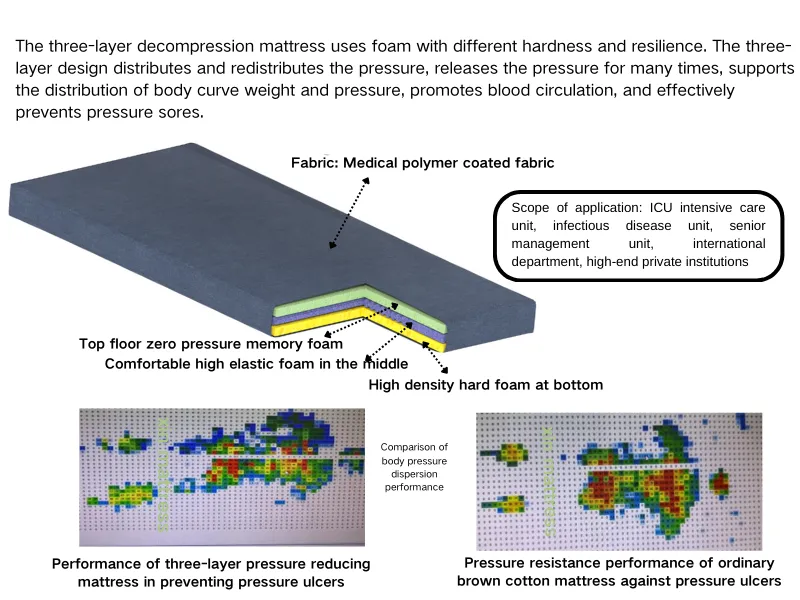Best Mattresses for Preventing Pressure Ulcers and Promoting Comfort During Bed Rest
Understanding Decubitus Ulcer Mattresses A Comprehensive Overview
Decubitus ulcers, commonly known as pressure sores or bedsores, are injuries to the skin and underlying tissue that result from prolonged pressure on the skin. These wounds can occur in individuals who are bedridden, wheelchair-bound, or have limited mobility. They often develop in bony areas of the body, such as the heels, sacrum, and elbows. The prevention and management of these ulcers are crucial, especially in healthcare settings. One effective tool in this endeavor is the decubitus ulcer mattress.
What is a Decubitus Ulcer Mattress?
A decubitus ulcer mattress is specifically designed to alleviate pressure on vulnerable areas of the body and prevent the formation of pressure sores. These mattresses come in various forms, including foam, gel, and air-filled options, each with its unique features aimed at redistributing body weight and providing support.
1. Foam Mattresses These are made from high-density foam that conforms to the body’s contours. They provide excellent support and distribute weight evenly, which helps reduce pressure points. Many foam mattresses are also designed with cutouts or channels to promote airflow, further enhancing comfort and reducing moisture buildup.
2. Gel Mattresses Gel-infused mattresses offer the benefit of cooling properties, which can be particularly helpful for those who may be prone to overheating. The gel material helps to disperse body heat and maintain a comfortable sleeping temperature, while also providing pressure relief similar to foam mattresses.
3. Air-Filled Mattresses These mattresses consist of multiple air cells that can be inflated or deflated to adjust firmness. This dynamic system allows for continuous pressure relief by changing the pressure points regularly as the individual shifts. Some advanced models also feature automatic adjustments based on the user's movements, ensuring optimal support at all times.
Why is a Decubitus Ulcer Mattress Important?
The importance of using a decubitus ulcer mattress cannot be overstated. For individuals at high risk of developing pressure sores, these specialized mattresses play a vital role in promoting skin integrity and overall well-being.
- Pressure Redistribution By distributing weight evenly, these mattresses minimize the risk of pressure buildup in sensitive areas. This is essential in reducing the incidence of decubitus ulcers, which can lead to severe pain, infection, and extended hospital stays if not effectively managed.
decubitus ulcer mattress

- Enhanced Comfort Patients who are confined to bed for long periods often experience discomfort, which may further exacerbate their condition
. Using a decubitus ulcer mattress promotes better sleep quality, allowing for improved rest and recovery.- Cost-Effectiveness Investing in a high-quality mattress can significantly reduce healthcare costs associated with treating pressure ulcers. The prevention of these sores translates to fewer medical interventions, less time spent in healthcare facilities, and a better quality of life for patients.
Choosing the Right Decubitus Ulcer Mattress
When selecting a decubitus ulcer mattress, several factors should be considered
- Level of Risk Assess the patient's level of risk for developing pressure ulcers. Healthcare providers can utilize tools such as the Braden Scale to help determine the appropriate type of mattress.
- Mobility Level Consider whether the individual can shift their weight independently. Those with limited mobility may benefit more from advanced air-filled mattresses that provide adjustable support.
- Comfort Preferences Every individual has different comfort levels. It’s essential to choose a mattress that suits the personal preference of the patient, as this can significantly influence use and compliance.
- Maintenance Needs Evaluate the maintenance requirements of the mattress. Some models may require regular cleaning or care, which should align with the caregiver's capabilities.
Conclusion
In summary, decubitus ulcer mattresses are an essential component in the prevention and management of pressure sores. By understanding the different types of mattresses available and their benefits, caregivers and healthcare professionals can make informed decisions that enhance patient care and comfort. Ultimately, the right mattress can significantly improve the quality of life for individuals at risk of decubitus ulcers, providing peace of mind for patients and their families alike. Investing in such preventative measures is not just a matter of comfort; it’s an essential aspect of compassionate and effective healthcare.
-
The Effect of Coconut Foam Mattress Breathability and Humidity Regulation on Improving Sleep QualityNewsJul.03,2025
-
How Wave Mattress Systems Improve Blood Circulation During ImmobilityNewsJul.03,2025
-
The Climate-Adaptive Sleep Revolution: Exploring the Benefits of Cooling Gel Memory Foam MattressesNewsJul.03,2025
-
Exploration of the Role of Coconut Foam Mattress in Preventing Bedsores in the ElderlyNewsJul.03,2025
-
Comparing Wave Mattress and Air Mattress: Which Is Better for Medical Use?NewsJul.03,2025
-
Analysis of Comfort and Environmental Performance of Natural Latex and Coconut Foam MattressNewsJul.03,2025
-
Multi-Layer Construction for Enhanced Performance in Gel Mattress PadNewsJun.24,2025

